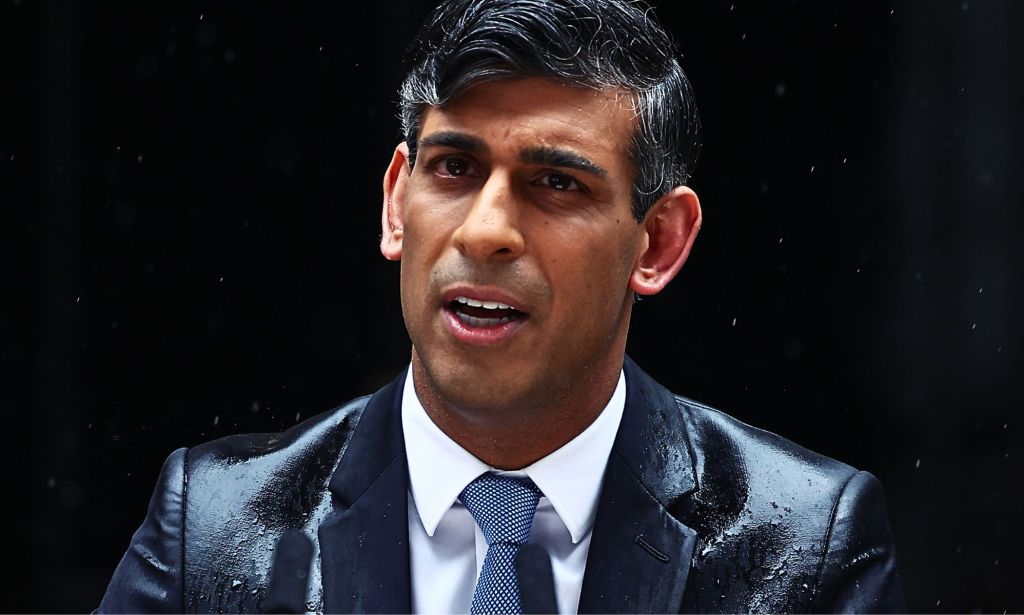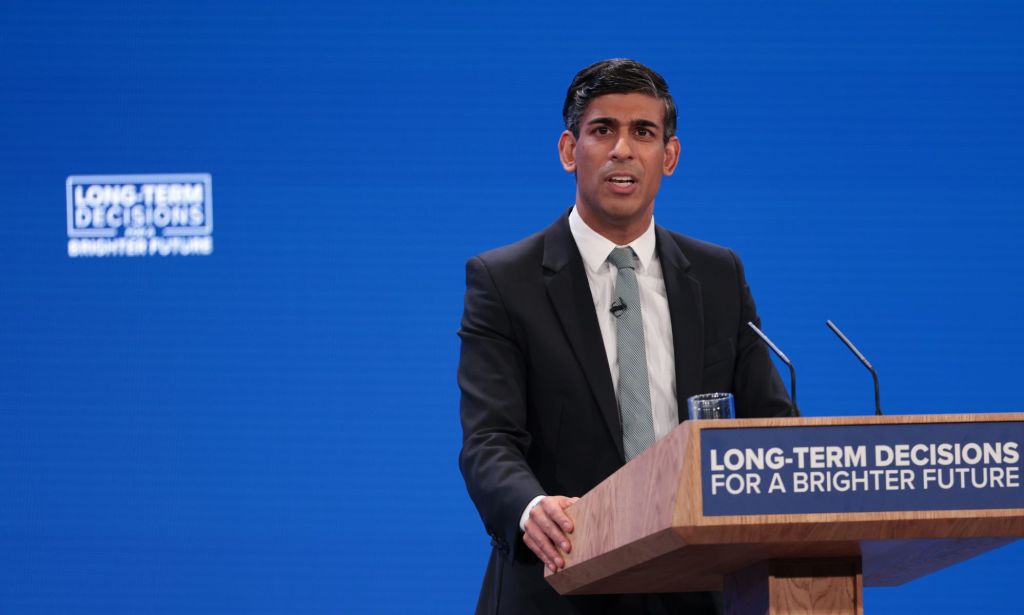Rishi Sunak on his infamous trans joke and why the Conservatives ‘do not believe in self-ID’

(Jeff J Mitchell/Getty/Canva)
Rishi Sunak has claimed that Britain is “one of the best places in the world to be LGBT”, despite the country falling down international rankings in recent years.
In an exclusive interview with PinkNews ahead of the general election on Thursday (4 July), the prime minister touched on a number of key LGBTQ+ issues, such as waiting lists for transgender patients, self-ID, conversion therapy and his joke at the expense of trans women.
What would you do for LGBTQ+ people if you were elected?
The Conservative Party has a strong legacy of achievements in improving the lives of LGBT people. From legalising same-sex marriage and improving fertility services for same-sex couples, to global leadership on HIV prevention and pioneering the largest rollout of PrEP [pre-exposure prophylaxis] in Europe, we have consistently taken bold steps to materially improve LGBT people’s lives. In the next Parliament, we will build on these efforts, not least by implementing the HIV Action Plan, which will end new HIV transmissions by 2030, and exploring the expansion of HIV opt-out testing in emergency departments in England.
Why should LGBTQ+ people vote for you?
Our record on improving LGBT people’s lives over the past 14 years is unparalleled. We introduced same-sex marriage, affirming the right of every individual to marry whom they love. Our commitment to HIV/AIDS initiatives has positioned us as a global leader in prevention and treatment programmes. We rolled out HAART treatment for HIV; achieved the 90-90-90 HIV targets in 2018, the first country in the world to do so; funded the first-ever HIV testing week and campaigns within the BAME community; legalised and implemented self-testing kits and pioneering PrEP trials; launched a HIV Commission and introduced the first HIV action plan aimed at ending new HIV transmissions by 2030; invested over £3.5 million in a national HIV prevention programme; and rolled out HIV opt-out testing and instant test results. Since 2010, because of this work carried out in partnership with charities such as THT and NAT, HIV deaths have reduced by 51% and new diagnoses have reduced by 73%.
Elsewhere, we have removed HIV status discrimination in the Armed Forces, removed barriers to IVF for lesbian couples, introduced LGBT relationship education in schools while Labour was virtually mute on the issue; passed historic pardons for gay men and lesbians while issuing an apology to LGBT veterans; and implemented a world-leading vaccination program in response to the Monkeypox outbreak. Our dedication to LGBT people is not just in words but in actions. Your vote is a vote for continued solid progress and an unwavering commitment to improving LGBT people’s lives.

The UK was 1st for LGBTQ+ rights on ILGA-Europe’s annual Rainbow Map in 2015 and dropped to 16th place in 2024. Why has a Conservative government allowed this to happen? What will you do to return the country to the top spot?
This is an example of focusing on perceptions rather than the actions taken. When Britain was positioned lower down in these surveys before, we were one of a minority of countries which had statutory LGBT education in schools. Countries where children did not learn that some people have two mothers or two fathers were higher up than us. Likewise, Britain has been positioned lower down while being one of the countries with same-sex marriage. Countries in which there wasn’t equality under the law, such as Greece who only legalised same-sex marriage this year, were positioned higher.
I believe Britain is one of the best places in the world to be LGBT, and Conservatives have been working to deliver the significant legislative and policy changes that have had an undeniably positive impact on LGBT people across Britain. We are dedicated to continuing this progress, creating a society where everyone can thrive without discrimination and where LGBT people can live their lives with pride.
Trans people, especially trans youth, are waiting years for their first appointment at a gender identity clinic. What will you do to bring these waiting lists down?
I will always back the NHS so that everyone can get the care they need. I won’t patronise you – a once-in-a-century pandemic placed our NHS under huge strain, but we are ensuring it is well supported to recover and those who suffer from gender dysphoria can receive the support they need. For example, we are establishing two new children and young people’s gender services – the first of up to eight regional centres, based within specialist children’s hospitals, to be commissioned over the next two years. However, at the same time, I do think we need to exercise caution with gender-identity healthcare issues in light of the Cass Review, particularly when it comes to children – and I will never shy away from that. NHS England made clear, for example, that children should not be given feminising/masculinising hormones, and we have also implemented an emergency ban on private prescriptions of puberty blockers to children in line with NHS policy. It’s important that children are protected from irreversible interventions when we simply don’t know enough about their long-term effects. It’s also important that children aren’t told that they have been born in the wrong body or that they need drugs and surgery to fix them simply because they are same-sex attracted. That is to deny the reality of being LGB.
Belgium, Denmark, Iceland, Ireland, Malta, Luxembourg, Norway, Portugal, Switzerland, and soon Germany all have self-ID for trans people. Why shouldn’t the UK implement a similar policy?
We do not believe in self-ID because we believe in biological sex. However, we of course support trans adults if they wish to change their gender and live their lives as they choose, which is why we reduced the financial burden on trans adults by reducing the price of a Gender Recognition Certificate. But that does mean that such decisions can come at the expense of single-sex spaces and the rights and safety of women and girls, which is why I believe it’s right that the current system of checks and balances should remain in place. Living as a trans woman, for example, for two years and receiving medical consultations is entirely different to being able to declare you are a different gender on the spot. That would put the safety of women and girls at risk – not by genuine trans people, who just want to get on with their lives – but by biological men who would exploit the rules to cause harm to women and girls.

If elected, would you finally ban conversion ‘therapies’, including those targeting trans people?
Let me be clear – nobody in Britain should be harmed or harassed for who they are. LGBT people should be free to live their lives with pride and without threat or fear, and Britain already has one of the world’s strongest legislative frameworks to prevent and tackle discrimination and harassment against those with particular protected characteristics, including sexual orientation and gender reassignment. Attempts at so-called ‘conversion therapy’ are of course abhorrent. But legislation around these practices is a very complex issue and must be approached with sensitivity and thought. Particularly in light of the Cass Review, it is right that we take more time before reaching a final judgement on additional legislation.
Sexual orientation hate crimes have increased fivefold between 2011 and 2023, what will you do to tackle anti-LGBTQ+ hate?
It’s appalling that in 2024 anybody should be the victim of a crime simply because of who they love. I find that completely abhorrent and want to ensure that you are safe on the streets of our country no matter your sexuality. That’s why we will recruit another 8,000 new full-time police officers with full power of arrest as part of a new Neighbourhood Policing Uplift Programme. It’s also why we Conservatives passionately backed relationship education in schools so that children grow up knowing that there is nothing wrong with being gay. While Labour shied away from this, cowing to religious opposition, Conservatives stood up and implemented it in the face of the storm. It was yet another example of Conservative action compared to empty Labour rhetoric.
Last year a recording came out of you making a joke at the expense of trans women. Why should trans people trust you to defend their rights?
I completely reject that. I care very much about making sure that trans people are treated with compassion and are able to live with dignity and respect. I was simply highlighting that Keir Starmer wasn’t able to provide the definition of a woman, and we should be able to say that sex is real and based on biology. That doesn’t mean that we don’t support trans people or want them to live their lives with dignity and respect – we do. But pretending that biological sex doesn’t exist or calling into question single-sex spaces or protections for women and girls does not help trans people or make their lives better. All it does is erode trust among the public who – while sympathetic to trans people – want to know that their politicians understand that biological sex is real.
You are promising to change the Equality Act’s definition of ‘sex’ to ‘biological sex’. Can you explain why this is needed, provide a definition of ‘biological sex’, and explain how it would include intersex people and trans people who have received a gender recognition certificate?
The Equality Act has been in place more than a decade and it has not kept pace with evolving interpretations, resulting in confusion over what means sex and what means gender. The current interpretation of the law means that, for example, an informal women’s victim support group that seeks to provide a space for women victims to share intimate and painful experiences – in the absence of biological men – cannot legally limit membership to biological women only. I don’t think that’s right, so we need to clarify that the protected characteristic of sex in the Equality Act means biological sex. This will guarantee that single-sex services and single-sex spaces can be provided, for example in healthcare and sports settings, to ensure women and girls are protected.
Your manifesto states that you will “complete the implementation of the Cass Review”. An independent study found “significant methodological and conceptual flaws” in that report. Do you still stand by the Cass Review, why are you politicising trans people’s access to healthcare, are you aware that by “protecting young people questioning their gender” as you phrase it in your manifesto, you may end up hurting them?
I completely disagree with that characterisation. The Cass Review was a robust, evidence-based, independent piece of work – and I would repeat that we need to exercise extreme caution when it comes to medical interventions that are not based in long-term data and evidence to protect children and those who are vulnerable. Anyone truly concerned about protecting children from hurt would err on the side of caution rather than ploughing ahead with medical interventions that are at best extremely contentious.
How did this story make you feel?

